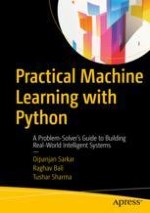2018 | OriginalPaper | Buchkapitel
2. The Python Machine Learning Ecosystem
verfasst von : Dipanjan Sarkar, Raghav Bali, Tushar Sharma
Erschienen in: Practical Machine Learning with Python
Verlag: Apress
Aktivieren Sie unsere intelligente Suche, um passende Fachinhalte oder Patente zu finden.
Wählen Sie Textabschnitte aus um mit Künstlicher Intelligenz passenden Patente zu finden. powered by
Markieren Sie Textabschnitte, um KI-gestützt weitere passende Inhalte zu finden. powered by
